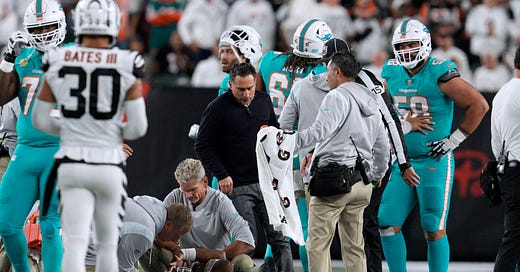How Do You Solve a Problem Like Football?
I’ve avoided writing anything about the Tua Tagovailoa injury because of how sickening the whole thing is. Watching Tua get carted off the field last Thursday was hard to watch, both because of the injury itself and how predictable it was, or at least should have been. It was clear to many people who watched him the previous week that his “back injury” was not really a back injury – the Players Association immediately ordered an investigation into the decision to allow him back in the game after what certainly looked like a head injury.

And yet just four days later, he was starting for the Dolphins on Thursday Night Football, and sustained a concussion, leading to concerns about second-impact syndrome, which could have very serious long-term consequences for Tagovailoa.
Much of the discussion since Thursday has been about the NFL’s concussion protocols: whether they were followed, if they’re effective, etc. But obviously this injury once again raises the question of whether there’s any safe or ethical way to play football.
You might remember our podcast episode from last year, about the supposed “death of football” (if you don’t, check it out, it’s a good ep).
In it, we discussed the idea that football might gradually die out in the next decade or so. This idea was semi-popular, at least in certain media circles, about a decade ago, when people like Barack Obama and LeBron James were saying they wouldn’t let their kids play football, out of safety concerns. Now, of course, football is more popular than ever, and it’s harder to find people willing to make that argument…
But football has gotten no less brutal, and Tua’s injury shows that many of the steps the NFL took to address brain health were really just window-dressing to deflect from some bad headlines about CTE. So what now?
I’m honestly asking.
The most common answer is that people should just stop watching football, because it is immoral. I have been critical of this reaction, since it seems to elevate the importance of individual consumer choices, but I don’t want to be too dismissive. There certainly is a place for moral suasion, and I think it’s hard to deny that the sport is violent and dangerous.
But we ought to acknowledge that this strategy has not been very effective. As mentioned, football is more popular than ever, at least if we go by TV ratings, and it seems that the Quit Football people have not really made much progress outside of their own echo chamber. Not to go in a whole, “In these polarized times…” direction, but it does seem like moral suasion has serious limitations when it comes from an out-group. In this case, people who have Quit Football are, by definition, no longer in the world of football fans, and so it’s easy for them to be ignored by those still in that world. It’s not like football is desperate for new fans; this isn’t baseball. If you don’t watch, then someone else will…
On the other hand, the Tua situation shows the challenges of my preferred solution, worker power. It’s true that the NFLPA intervened in this case, but its review process was not quick enough to protect Tagovailoa. And, crucially, one of the issues was that Tua wanted to go back in the game. It is simply hard to trust players to look out for themselves. Most people attribute this to the way toughness is valorized in the sport, and that is certainly a factor. But playing in the NFL, or at a top college team, is also just a dream come true for most players, and they don’t want to miss it because of an injury.
Better protocols can address some of this, but what if, as some say is true, there is simply no safe way to play football? Empowered workers will generally push for safety protections – but they won’t push for the elimination of their industry. We see how fossil fuel workers or private insurance companies react when told their jobs might be eliminated because preserving them is bad for society. So is the NFLPA really going to decide that football is too dangerous to keep playing?
It seems that the most likely outcome is that we’ll keep tinkering around the edges of the system, while most of the damage is done out of the spotlight. Every few years we’ll have to witness something like the Tua injury, and people will say what a travesty it is, but then they’ll move on to something else. In general, people will assume it’s Not That Bad – not because it’s not a problem, but because, like so many social problems, we just don’t know how to fix it.
But if anyone has any ideas, I’m all ears…



